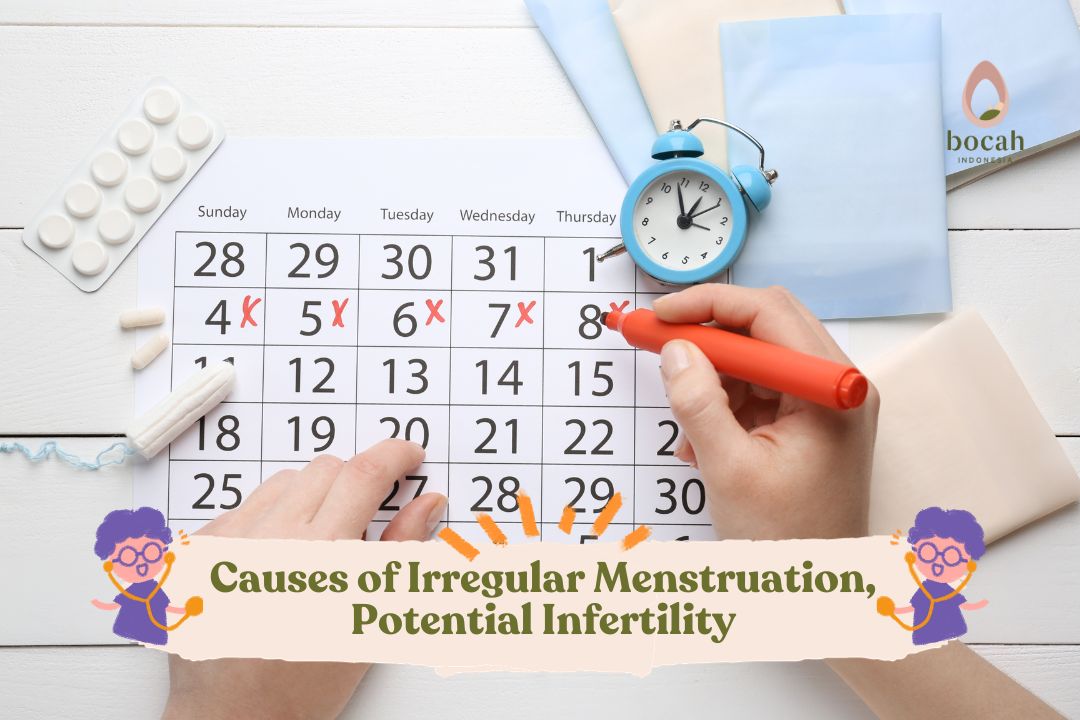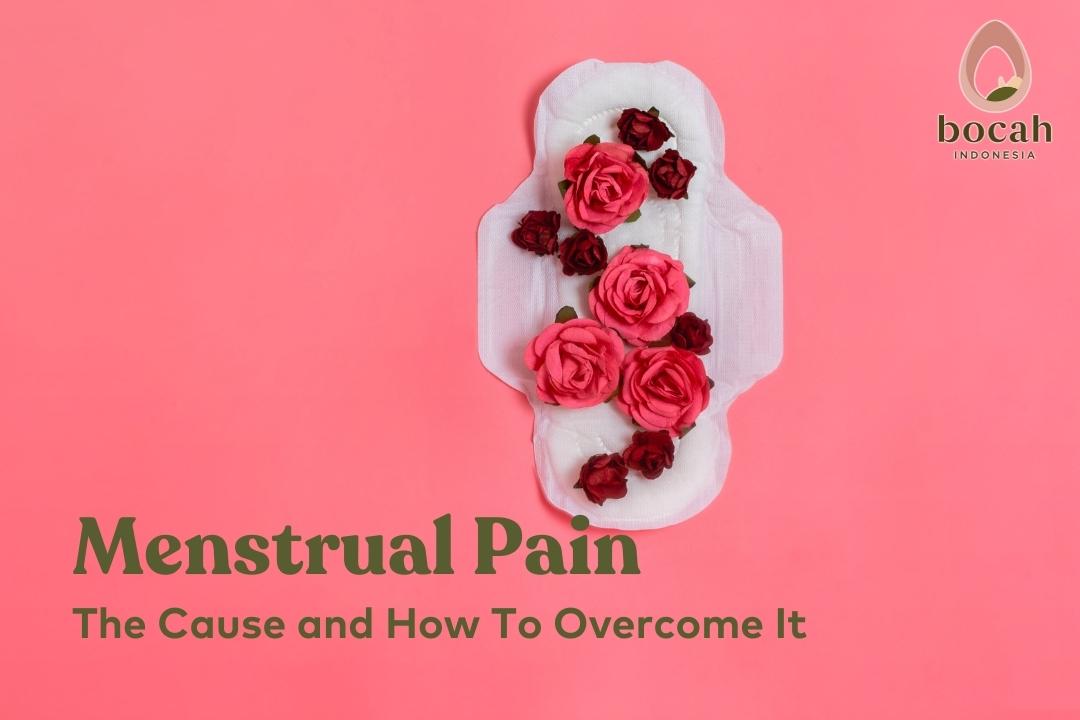Irregular Menstruation, Infertile Potential?

Irregular menstruation can be caused by several factors. Irregular menstrual cycles can lead to fertility problems.
Have you ever experienced irregular menstrual cycles? This condition occurs when you have short or long menstrual cycles, and in some cases, menstruation may not occur at all. Some women consider this condition to be normal. Unfortunately, if this condition persists for an extended period, it may indicate a certain medical condition.
Normal Menstrual Cycle
Normally, a woman’s menstrual cycle is 28-34 days. If your menstrual cycle is less than 28 days or more than 35 days and varies every month, then your menstrual cycle is irregular. It’s important to note that every woman’s menstrual cycle is different.
The menstrual period lasts for 3-7 days. This can also vary from woman to woman because the duration depends on the amount of blood flow, whether it’s heavy or light.
If menstruation does not end during that time period, it can be caused by several conditions, such as taking birth control pills, having PCOS, adenomyosis, or thyroid disease.
Tanya Mincah tentang Promil?
Irregular Menstrual Cycle
Irregular menstrual cycles are usually experienced by teenagers who have just reached puberty. This is still considered normal because of hormonal imbalances. However, it doesn’t mean that adult women cannot experience it.
Unfortunately, if this condition persists continuously, it can be caused by several factors. Irregular menstruation can be characterized by varying blood volumes, either heavy or light.
Causes of Irregular Menstruation
There are several factors that can cause irregular menstruation, such as:
-
Use of contraception
Although it doesn’t happen to all women, the use of contraception can lead to changes in menstrual cycles. Contraceptive methods like IUDs, birth control pills, or spiral devices can cause this condition.
In some cases, women who use IUDs may experience heavier menstrual bleeding. On the other hand, the use of birth control pills can affect the volume of menstrual blood, especially in the early stages of use. In some cases, menstruation may not occur for up to 6 months.
-
Excessive or insufficient body weight
One of the causes of irregular menstrual cycles is having a body weight that exceeds the normal range or falls below it. Women who are obese can affect the levels of estrogen and insulin hormones, disrupting the menstrual cycle.
Meanwhile, women with below-normal body weight can lead to hormonal imbalances that also make the menstrual cycle irregular.
-
Polycystic Ovary Syndrome (PCOS)
If you have irregular menstrual cycles, be cautious, as it could be a sign of Polycystic Ovary Syndrome (PCOS). This condition is a hormonal disorder that affects women and is characterized by infrequent or prolonged menstrual periods.
This happens because the ovaries produce excessive androgen hormones, preventing ovulation and causing irregular menstrual cycles.
PCOS can be one of the causes of fertility problems in women. Therefore, women with PCOS may take longer to achieve pregnancy.
-
Excessive exercise
Regular exercise is highly recommended to improve overall health and fertility. However, what happens when you exercise excessively? Excessive exercise can actually disrupt hormonal balance. This occurs because the body expends more calories than it takes in, leading to insufficient calories for the ovulation process.
-
Stress
Excessive stress can also cause irregular menstrual cycles, you know. Stress can affect the brain’s ability to control hormones that regulate the menstrual cycle. This can result in abnormal menstrual cycles when stress levels are high. Therefore, it’s important to manage stress effectively to restore a normal menstrual cycle.
-
Thyroid problems
Another cause of irregular menstruation is thyroid gland problems. The thyroid gland is located in the neck and produces hormones that regulate the body’s metabolism.
If the thyroid gland is malfunctioning, it can disrupt the menstrual cycle. If you experience this condition, it’s important to consult a doctor.
Managing Irregular Menstrual Cycles
Irregular menstrual cycles can lead to fertility problems. If not addressed promptly, this condition can make it difficult for you to get pregnant.
There are several ways to manage irregular menstrual cycles based on the underlying causes, such as:
-
Adopt a healthier lifestyle
-
Avoid excessive exercise
-
Manage stress effectively
-
Consider changing contraception methods if your menstrual cycle remains irregular after 3 months of use
-
For those with PCOS or thyroid disease, seek appropriate treatment
-
Undergo fertility assessments
Many women may not realize the importance of regular menstrual cycles. A normal menstrual cycle makes it easier to determine the fertile period and calculate when ovulation occurs.
Irregular menstrual cycles can affect fertility and be one of the reasons why it’s difficult to get pregnant. If this condition continues for an extended period, don’t ignore it. Consult with Bocah Indonesia for a thorough evaluation.
Share this important information with other women who may be experiencing similar conditions so they can seek early evaluation.
Source:
- The American College of Obstetricians and Gynecologists. Abnormal Uterine Bleeding.
- National Health Service. Irregular periods.
- Polycystic Ovarian Disease. Treasure Island (FL): StatPearls Publishing; 2023 Jan-.
- Ko, M.K., et al. (2017). Association between Body Weight Changes and Menstrual Irregularity: The Korea National Health and Nutrition Examination Survey 2010 to 2012. Endocrinol Metab (Seoul). 2017 Jun; 32(2): 248–256.
- Cho, G.J., et al. (2017). Effects of intensive training on menstrual function and certain serum hormones and peptides related to the female reproductive system. Medicine (Baltimore). 2017 May; 96(21): e6876.



